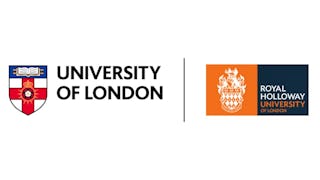Filter by
SubjectRequired
LanguageRequired
The language used throughout the course, in both instruction and assessments.
Learning ProductRequired
LevelRequired
DurationRequired
SkillsRequired
SubtitlesRequired
EducatorRequired
Find the Best Accounting Course for Your Goals

University of London
Skills you'll gain: Process Design, Global Marketing, Consumer Behaviour, Statistical Analysis, Organizational Change, Integrated Marketing Communications, Advertising, Innovation, Mergers & Acquisitions, Supply Chain Management, Training and Development, Virtual Teams, Diversity and Inclusion, Databases, Cost Accounting, International Finance, Research, Branding, Economic Development, Cultural Diversity

University of Illinois at Urbana-Champaign
Skills you'll gain: Data Storytelling, Management Accounting, Fund Accounting, Operations Management, Mergers & Acquisitions, Financial Statement Analysis, Marketing, Risk Management, Machine Learning Algorithms, Business Strategy, Financial Auditing, Descriptive Statistics, Variance Analysis, Process Improvement, Generative AI, Financial Market, Strategic Decision-Making, Corporate Tax, Global Marketing, Organizational Change

University of Illinois at Urbana-Champaign
Skills you'll gain: Data Storytelling, Management Accounting, Fund Accounting, Operations Management, Mergers & Acquisitions, Financial Statement Analysis, Marketing, Risk Management, Machine Learning Algorithms, Business Strategy, Financial Auditing, Descriptive Statistics, Variance Analysis, Process Improvement, Generative AI, Financial Market, Strategic Decision-Making, Corporate Tax, Global Marketing, Organizational Change

University of London
Skills you'll gain: Process Design, Global Marketing, Consumer Behaviour, Statistical Analysis, Organizational Change, Integrated Marketing Communications, Advertising, Innovation, Mergers & Acquisitions, Supply Chain Management, Training and Development, Virtual Teams, Diversity and Inclusion, Databases, Cost Accounting, International Finance, Research, Branding, Economic Development, Cultural Diversity

University of Illinois at Urbana-Champaign
Skills you'll gain: Data Storytelling, Management Accounting, Fund Accounting, Operations Management, Mergers & Acquisitions, Financial Statement Analysis, Marketing, Risk Management, Machine Learning Algorithms, Business Strategy, Financial Auditing, Descriptive Statistics, Variance Analysis, Process Improvement, Generative AI, Financial Market, Strategic Decision-Making, Corporate Tax, Global Marketing, Organizational Change

Pontificia Universidad Católica de Chile
Skills you'll gain: Financial Statement Analysis, Financial Statements, Capital Markets, Income Statement, Financial Analysis, Derivatives, Financial Market, Digital Transformation, Financial Reporting, Business Valuation, Accounting, Finance, Financial Accounting, Financial Regulation, Corporate Strategy, Value Propositions, Securities (Finance), Capital Budgeting, Corporate Finance, Technology Strategies

Pontificia Universidad Católica de Chile
Skills you'll gain: Financial Statement Analysis, Financial Statements, Capital Markets, Portfolio Management, Risk Management, Income Statement, Financial Market, Financial Analysis, Investments, Financial Reporting, Accounting, Financial Accounting, Financial Regulation, Accrual Accounting, Business Ethics, Balance Sheet, Cash Flows, Risk Analysis, Finance, Financial Modeling

University of Illinois at Urbana-Champaign
Skills you'll gain: Data Storytelling, Management Accounting, Fund Accounting, Operations Management, Mergers & Acquisitions, Financial Statement Analysis, Marketing, Risk Management, Machine Learning Algorithms, Business Strategy, Financial Auditing, Descriptive Statistics, Variance Analysis, Process Improvement, Generative AI, Financial Market, Strategic Decision-Making, Corporate Tax, Global Marketing, Organizational Change

University of Illinois at Urbana-Champaign
Skills you'll gain: Data Storytelling, Management Accounting, Fund Accounting, Operations Management, Mergers & Acquisitions, Financial Statement Analysis, Marketing, Risk Management, Machine Learning Algorithms, Business Strategy, Financial Auditing, Descriptive Statistics, Variance Analysis, Process Improvement, Generative AI, Financial Market, Strategic Decision-Making, Corporate Tax, Global Marketing, Organizational Change

University of Illinois at Urbana-Champaign
Skills you'll gain: Data Storytelling, Management Accounting, Fund Accounting, Operations Management, Mergers & Acquisitions, Financial Statement Analysis, Marketing, Risk Management, Machine Learning Algorithms, Business Strategy, Financial Auditing, Descriptive Statistics, Variance Analysis, Process Improvement, Generative AI, Financial Market, Strategic Decision-Making, Corporate Tax, Global Marketing, Organizational Change

University of Illinois at Urbana-Champaign
Skills you'll gain: Data Storytelling, Management Accounting, Fund Accounting, Operations Management, Mergers & Acquisitions, Financial Statement Analysis, Marketing, Risk Management, Machine Learning Algorithms, Business Strategy, Financial Auditing, Descriptive Statistics, Variance Analysis, Process Improvement, Generative AI, Financial Market, Strategic Decision-Making, Corporate Tax, Global Marketing, Organizational Change

University of North Texas
Skills you'll gain: Operations Management, Mediation, Integrated Marketing Communications, Compensation and Benefits, Organizational Change, Event Management, Grammar, Sales Process, Data Mining, Data Visualization, Design Thinking, Global Marketing, Probability & Statistics, Cultural Diversity, Digital Media Strategy, Organizational Leadership, Political Sciences, Social Justice, Music History, Sociology
In summary, here are 10 of our most popular accounting courses
- Bachelor of Science in Marketing: University of London
- Value Chain Management Graduate Certificate: University of Illinois at Urbana-Champaign
- Entrepreneurship and Strategic Innovation Graduate Certificate: University of Illinois at Urbana-Champaign
- Bachelor of Science in Business Administration: University of London
- Global Challenges in Business Graduate Certificate: University of Illinois at Urbana-Champaign
- Certificado en Finanzas Corporativas: Pontificia Universidad Católica de Chile
- Certificado en Gestión de Inversiones: Pontificia Universidad Católica de Chile
- Financial Management Graduate Certificate: University of Illinois at Urbana-Champaign
- Graduate Certificate in Taxation: University of Illinois at Urbana-Champaign
- Managerial Economics & Business Analysis Graduate Certificate: University of Illinois at Urbana-Champaign










